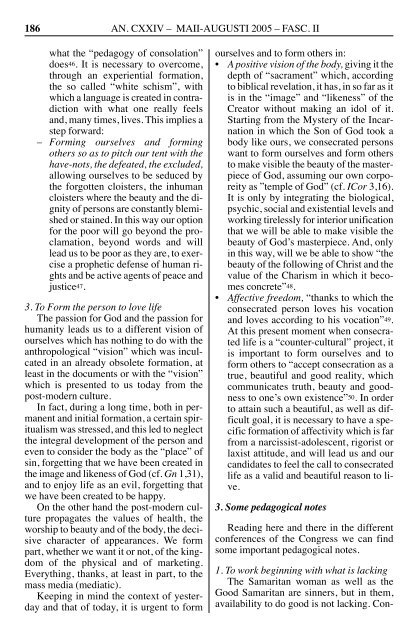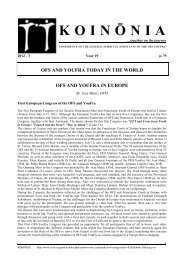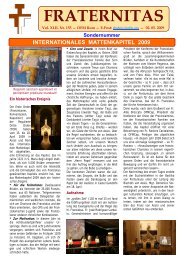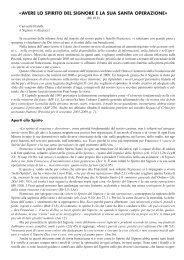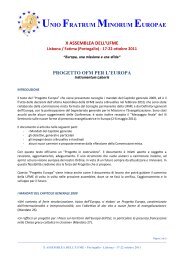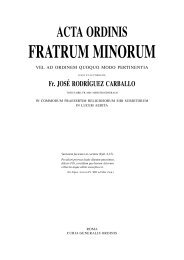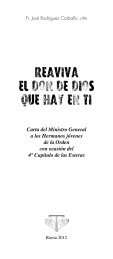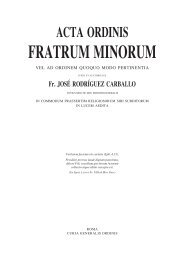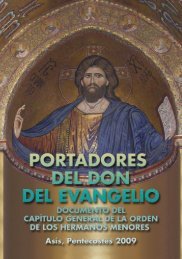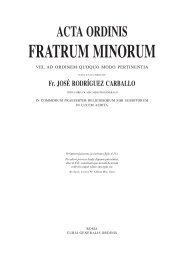Create successful ePaper yourself
Turn your PDF publications into a flip-book with our unique Google optimized e-Paper software.
186 AN. CXXIV – MAII-AUGUSTI 2005 – FASC. II<br />
what the “pedagogy of consolation”<br />
does46. It is necessary to overcome,<br />
through an experiential formation,<br />
the so called “white schism”, with<br />
which a language is created in contradiction<br />
with what one really feels<br />
and, many times, lives. This implies a<br />
step forward:<br />
– Forming ourselves and forming<br />
others so as to pitch our tent with the<br />
have-nots, the defeated, the excluded,<br />
allowing ourselves to be seduced by<br />
the forgotten cloisters, the inhuman<br />
cloisters where the beauty and the dignity<br />
of persons are constantly blemished<br />
or stained. In this way our option<br />
for the poor will go beyond the proclamation,<br />
beyond words and will<br />
lead us to be poor as they are, to exercise<br />
a prophetic defense of human rights<br />
and be active agents of peace and<br />
justice47.<br />
3. To Form the person to love life<br />
The passion for God and the passion for<br />
humanity leads us to a different vision of<br />
ourselves which has nothing to do with the<br />
anthropological “vision” which was inculcated<br />
in an already obsolete formation, at<br />
least in the documents or with the “vision”<br />
which is presented to us today from the<br />
post-modern culture.<br />
In fact, during a long time, both in permanent<br />
and initial formation, a certain spiritualism<br />
was stressed, and this led to neglect<br />
the integral development of the person and<br />
even to consider the body as the “place” of<br />
sin, forgetting that we have been created in<br />
the image and likeness of God (cf. Gn 1,31),<br />
and to enjoy life as an evil, forgetting that<br />
we have been created to be happy.<br />
On the other hand the post-modern culture<br />
propagates the values of health, the<br />
worship to beauty and of the body, the decisive<br />
character of appearances. We form<br />
part, whether we want it or not, of the kingdom<br />
of the physical and of marketing.<br />
Everything, thanks, at least in part, to the<br />
mass media (mediatic).<br />
Keeping in mind the context of yesterday<br />
and that of today, it is urgent to form<br />
ourselves and to form others in:<br />
• A positive vision of the body, giving it the<br />
depth of “sacrament” which, according<br />
to biblical revelation, it has, in so far as it<br />
is in the “image” and “likeness” of the<br />
Creator without making an idol of it.<br />
Starting from the Mystery of the Incarnation<br />
in which the Son of God took a<br />
body like ours, we consecrated persons<br />
want to form ourselves and form others<br />
to make visible the beauty of the masterpiece<br />
of God, assuming our own corporeity<br />
as ”temple of God” (cf. ICor 3,16).<br />
It is only by integrating the biological,<br />
psychic, social and existential levels and<br />
working tirelessly for interior unification<br />
that we will be able to make visible the<br />
beauty of God’s masterpiece. And, only<br />
in this way, will we be able to show “the<br />
beauty of the following of Christ and the<br />
value of the Charism in which it becomes<br />
concrete”48.<br />
• Affective freedom, “thanks to which the<br />
consecrated person loves his vocation<br />
and loves according to his vocation”49.<br />
At this present moment when consecrated<br />
life is a “counter-cultural” project, it<br />
is important to form ourselves and to<br />
form others to “accept consecration as a<br />
true, beautiful and good reality, which<br />
communicates truth, beauty and goodness<br />
to one’s own existence”50. In order<br />
to attain such a beautiful, as well as difficult<br />
goal, it is necessary to have a specific<br />
formation of affectivity which is far<br />
from a narcissist-adolescent, rigorist or<br />
laxist attitude, and will lead us and our<br />
candidates to feel the call to consecrated<br />
life as a valid and beautiful reason to live.<br />
3. Some pedagogical notes<br />
Reading here and there in the different<br />
conferences of the Congress we can find<br />
some important pedagogical notes.<br />
1. To work beginning with what is lacking<br />
The Samaritan woman as well as the<br />
Good Samaritan are sinners, but in them,<br />
availability to do good is not lacking. Con-


